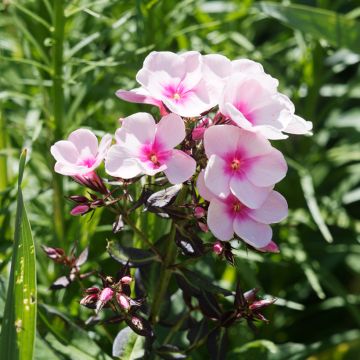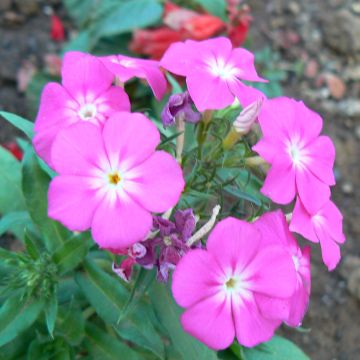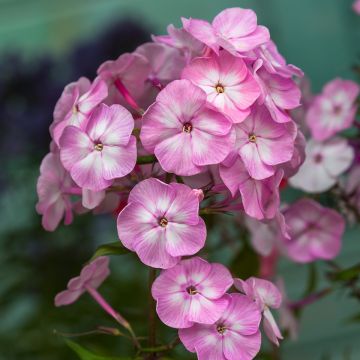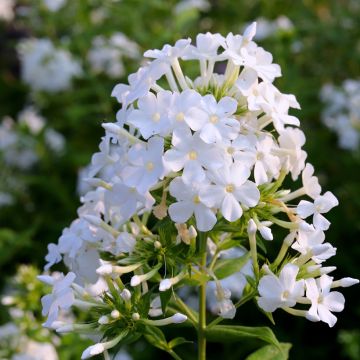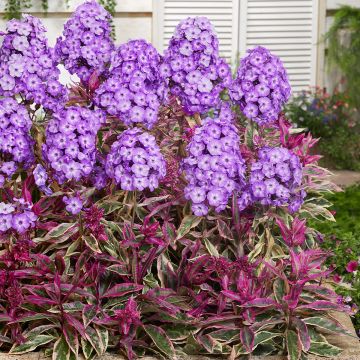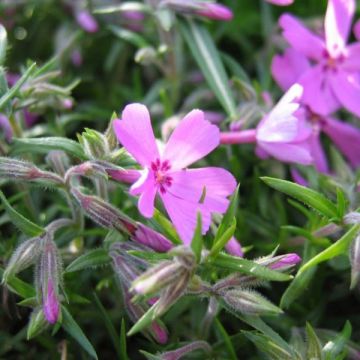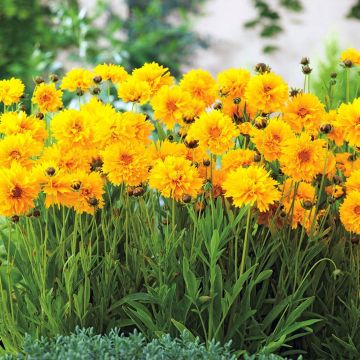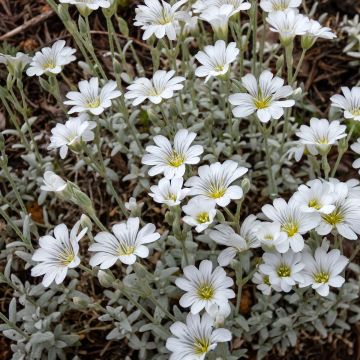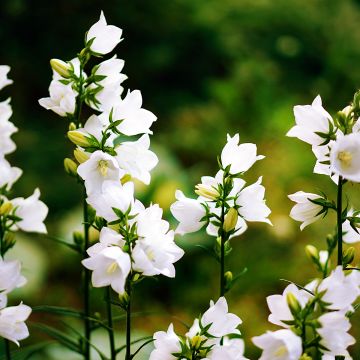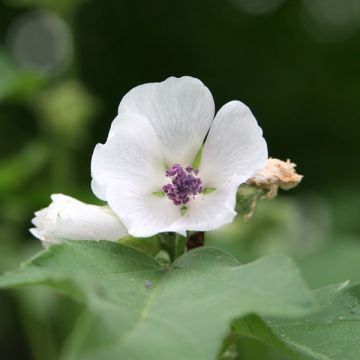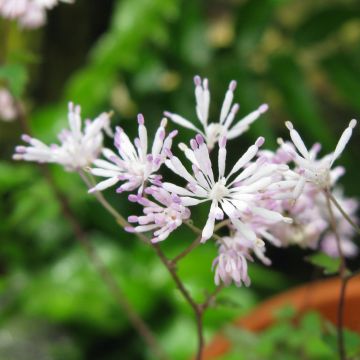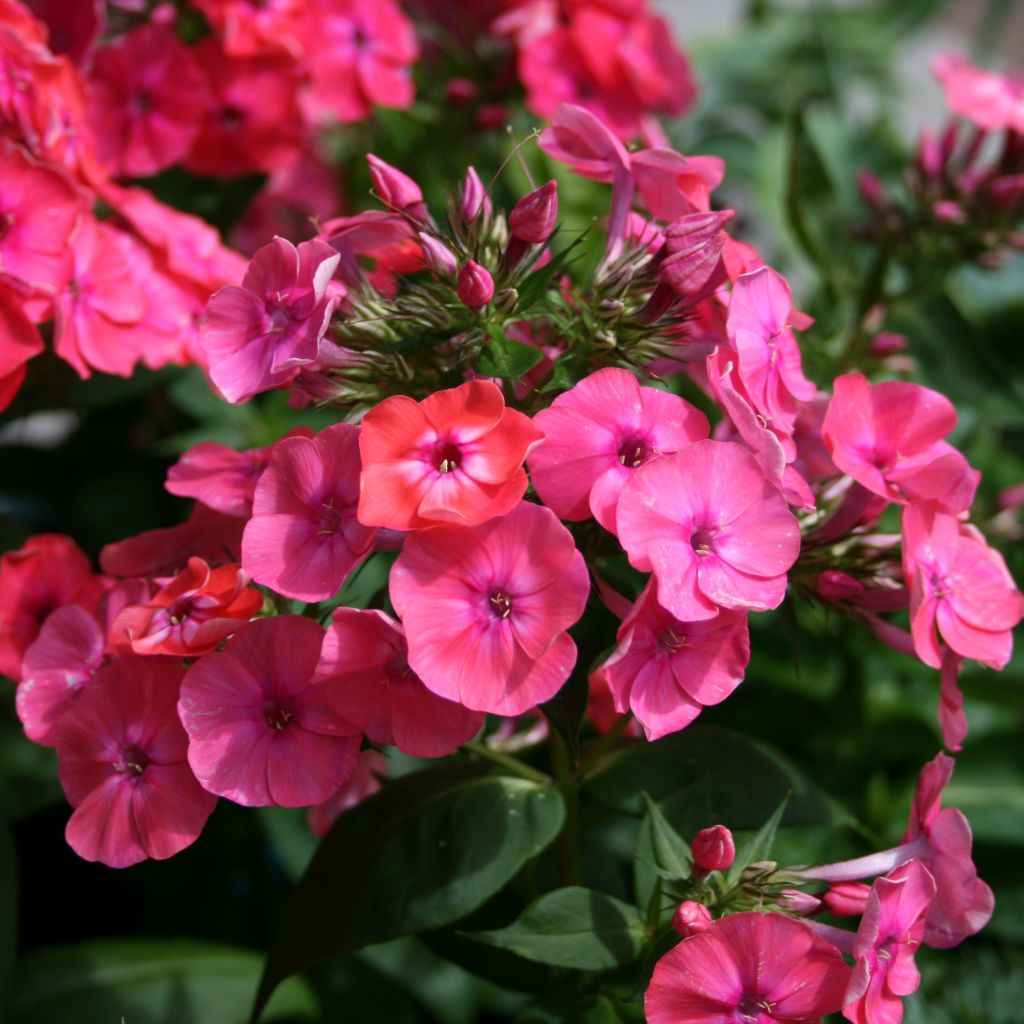

Phlox paniculata Coral Flame
Phlox paniculata Coral Flame
Phlox paniculata Coral Flame
Garden Phlox, Summer Phlox, Perennial Phlox
This item cannot be shipped to the selected country
Delivery charge from €5.90
More information
Schedule delivery date,
and select date in basket
This plant carries a 12 months recovery warranty
More information
We guarantee the quality of our plants for a full growing cycle, and will replace at our expense any plant that fails to recover under normal climatic and planting conditions.
From €5.90 for pickup delivery and €6.90 for home delivery
Express home delivery from €8.90.

Does this plant fit my garden?
Set up your Plantfit profile →
Description
Phlox paniculata 'Coral Flame' is undoubtedly one of the shortest and most compact varieties of Phlox paniculata. This recent Dutch selection forms a very dense plant that produces an abundance of intensely coral-red flowers, a wonderfully matching shade to its dark green satin foliage. They are grouped in large fragrant bouquets that bloom throughout the summer in damp and fertile soil. It is an accommodating perennial, which proves to be quite resistant to diseases. It is easy to grow and particularly suitable for borders, brilliantly occupying the front of flower beds and flower pots.
Phlox paniculata 'Coral Flame' belongs to the family of Polemoniaceae. It is a woody-stemmed herbaceous perennial plant forming a clump of leafy stems not exceeding 40 cm (16in) in height and 30 cm (12in) in width. The stems, stiff and brittle, are covered with alternate, simple, ovate, and lanceolate leaves, dark green with a shiny appearance. Flowering begins in mid-July, at the height of summer, and continues until September, provided that faded inflorescences are removed. The small flowers, measuring 1.5 to 2.5 cm (1in) in diameter, have a tubular corolla which is very bright red colour, shining under the sun. They are grouped at the tips of upright, dense, and round panicles, 15 cm (6in) in diameter, wonderfully fragrant, with their weight hardly bending the short stems. The flowering is nectar-rich and nectariferous.
Phlox paniculata are perennial plants accustomed to cottage gardens because their legendary simplicity and generosity are almost unmatched in perennial flower beds. They get along well with 'Mohawk' Monardas or 'Wirral Supreme' Daisies. 'Coral Flame' Phlox can be paired with dwarf asters (Aster dumosus), violet-blue Border Gem Phlox, or white flowers with which it forms a very cheerful combination. Dwarf phlox make good companions for ageratums and buglosses, creating a contrasting colour combination. 'Coral Flame' Phlox is a top-notch perennial plant to brighten up flowering pots that will adorn balconies and patios.
Report an error about the product description
Phlox paniculata Coral Flame in pictures
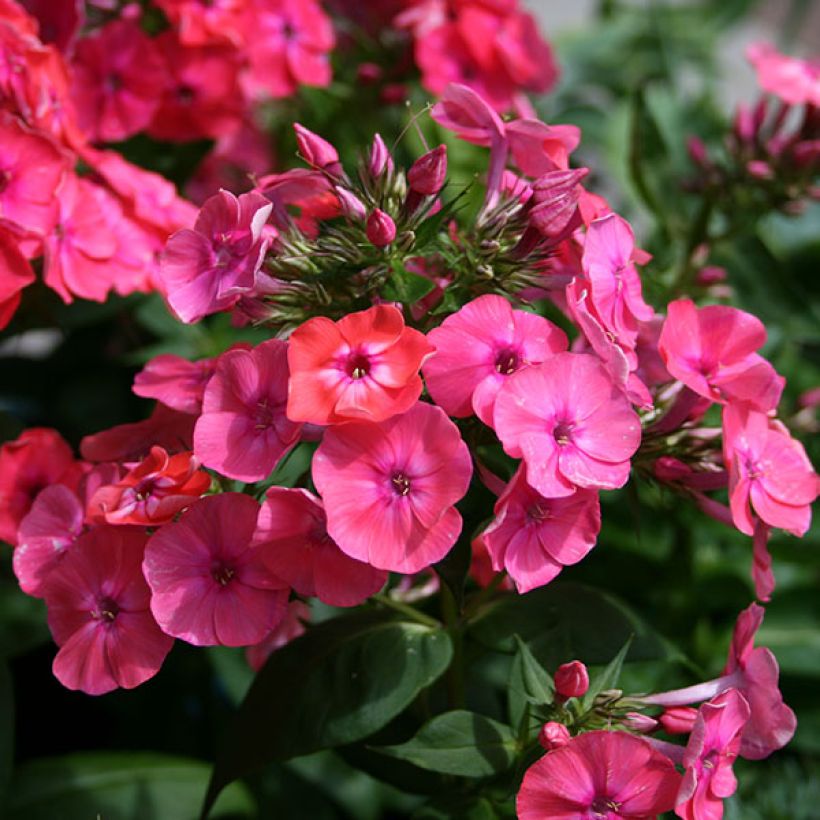

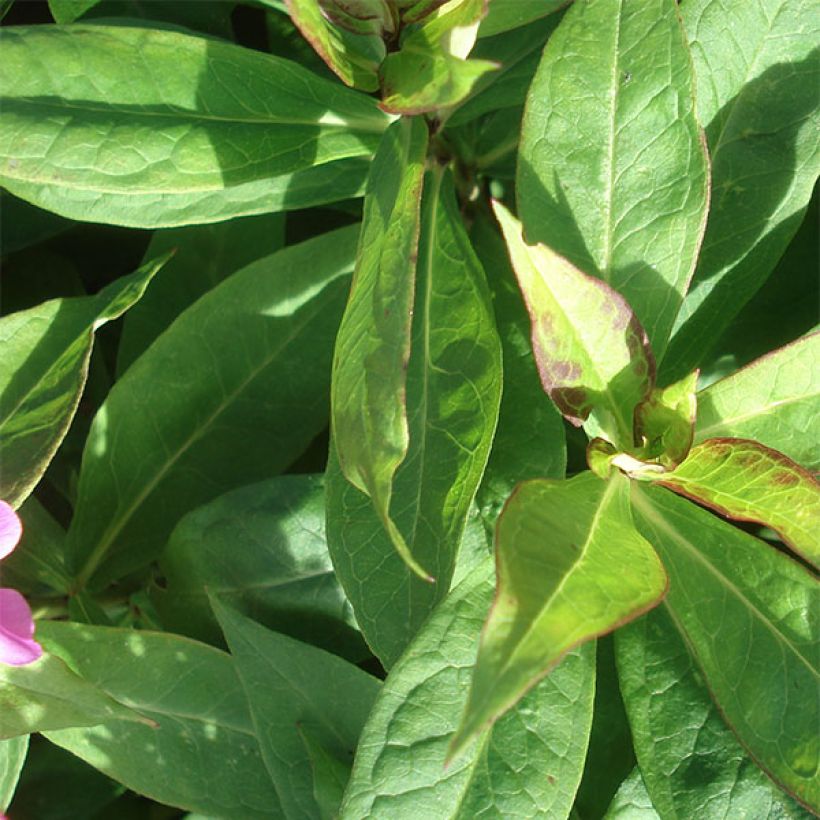

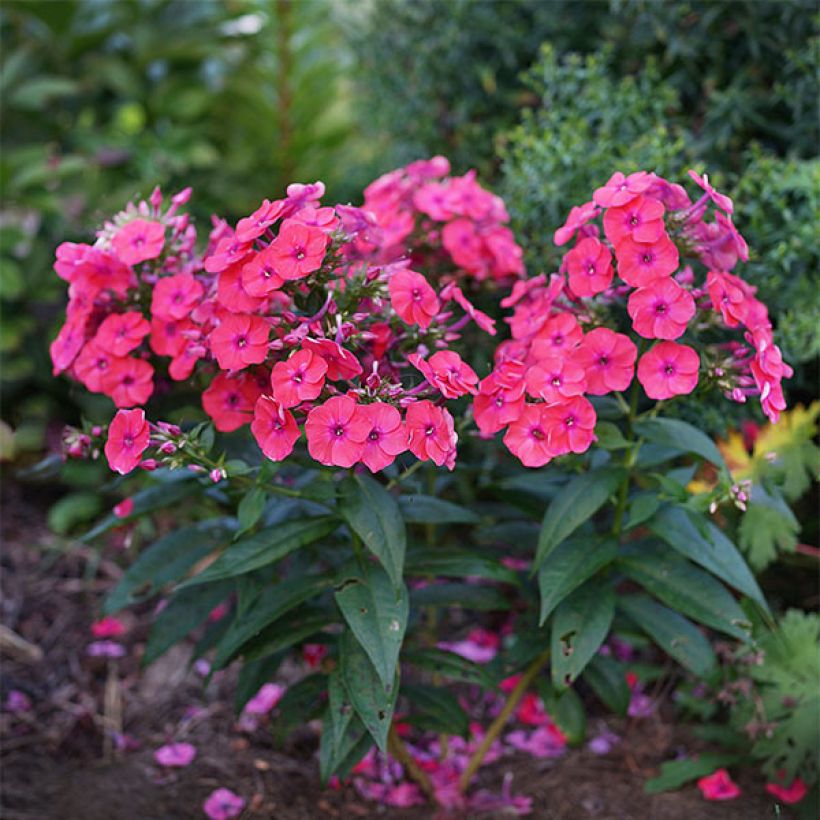

Flowering
Foliage
Plant habit
Botanical data
Phlox
paniculata
Coral Flame
Polemoniaceae
Garden Phlox, Summer Phlox, Perennial Phlox
Cultivar or hybrid
Other Phlox
Planting and care
Phlox paniculata are easy to grow plants. The 'Coral Flame' phlox prefers a moist and rich soil, even clay soils. It needs sun to flower well. An environment that is too dry or too hot makes the foliage susceptible to powdery mildew. Planted in the sun in a climate with hot summers, it requires regular watering and mulching at the base. Pruning faded flowers promotes a second flowering at the end of the season. Protect young plants from slugs, which are fond of their tender shoots.
Planting period
Intended location
Care
-
, onOrder confirmed
Reply from on Promesse de fleurs
Summer flowering perennials
Haven't found what you were looking for?
Hardiness is the lowest winter temperature a plant can endure without suffering serious damage or even dying. However, hardiness is affected by location (a sheltered area, such as a patio), protection (winter cover) and soil type (hardiness is improved by well-drained soil).

Photo Sharing Terms & Conditions
In order to encourage gardeners to interact and share their experiences, Promesse de fleurs offers various media enabling content to be uploaded onto its Site - in particular via the ‘Photo sharing’ module.
The User agrees to refrain from:
- Posting any content that is illegal, prejudicial, insulting, racist, inciteful to hatred, revisionist, contrary to public decency, that infringes on privacy or on the privacy rights of third parties, in particular the publicity rights of persons and goods, intellectual property rights, or the right to privacy.
- Submitting content on behalf of a third party;
- Impersonate the identity of a third party and/or publish any personal information about a third party;
In general, the User undertakes to refrain from any unethical behaviour.
All Content (in particular text, comments, files, images, photos, videos, creative works, etc.), which may be subject to property or intellectual property rights, image or other private rights, shall remain the property of the User, subject to the limited rights granted by the terms of the licence granted by Promesse de fleurs as stated below. Users are at liberty to publish or not to publish such Content on the Site, notably via the ‘Photo Sharing’ facility, and accept that this Content shall be made public and freely accessible, notably on the Internet.
Users further acknowledge, undertake to have ,and guarantee that they hold all necessary rights and permissions to publish such material on the Site, in particular with regard to the legislation in force pertaining to any privacy, property, intellectual property, image, or contractual rights, or rights of any other nature. By publishing such Content on the Site, Users acknowledge accepting full liability as publishers of the Content within the meaning of the law, and grant Promesse de fleurs, free of charge, an inclusive, worldwide licence for the said Content for the entire duration of its publication, including all reproduction, representation, up/downloading, displaying, performing, transmission, and storage rights.
Users also grant permission for their name to be linked to the Content and accept that this link may not always be made available.
By engaging in posting material, Users consent to their Content becoming automatically accessible on the Internet, in particular on other sites and/or blogs and/or web pages of the Promesse de fleurs site, including in particular social pages and the Promesse de fleurs catalogue.
Users may secure the removal of entrusted content free of charge by issuing a simple request via our contact form.
The flowering period indicated on our website applies to countries and regions located in USDA zone 8 (France, the United Kingdom, Ireland, the Netherlands, etc.)
It will vary according to where you live:
- In zones 9 to 10 (Italy, Spain, Greece, etc.), flowering will occur about 2 to 4 weeks earlier.
- In zones 6 to 7 (Germany, Poland, Slovenia, and lower mountainous regions), flowering will be delayed by 2 to 3 weeks.
- In zone 5 (Central Europe, Scandinavia), blooming will be delayed by 3 to 5 weeks.
In temperate climates, pruning of spring-flowering shrubs (forsythia, spireas, etc.) should be done just after flowering.
Pruning of summer-flowering shrubs (Indian Lilac, Perovskia, etc.) can be done in winter or spring.
In cold regions as well as with frost-sensitive plants, avoid pruning too early when severe frosts may still occur.
The planting period indicated on our website applies to countries and regions located in USDA zone 8 (France, United Kingdom, Ireland, Netherlands).
It will vary according to where you live:
- In Mediterranean zones (Marseille, Madrid, Milan, etc.), autumn and winter are the best planting periods.
- In continental zones (Strasbourg, Munich, Vienna, etc.), delay planting by 2 to 3 weeks in spring and bring it forward by 2 to 4 weeks in autumn.
- In mountainous regions (the Alps, Pyrenees, Carpathians, etc.), it is best to plant in late spring (May-June) or late summer (August-September).
The harvesting period indicated on our website applies to countries and regions in USDA zone 8 (France, England, Ireland, the Netherlands).
In colder areas (Scandinavia, Poland, Austria...) fruit and vegetable harvests are likely to be delayed by 3-4 weeks.
In warmer areas (Italy, Spain, Greece, etc.), harvesting will probably take place earlier, depending on weather conditions.
The sowing periods indicated on our website apply to countries and regions within USDA Zone 8 (France, UK, Ireland, Netherlands).
In colder areas (Scandinavia, Poland, Austria...), delay any outdoor sowing by 3-4 weeks, or sow under glass.
In warmer climes (Italy, Spain, Greece, etc.), bring outdoor sowing forward by a few weeks.

































